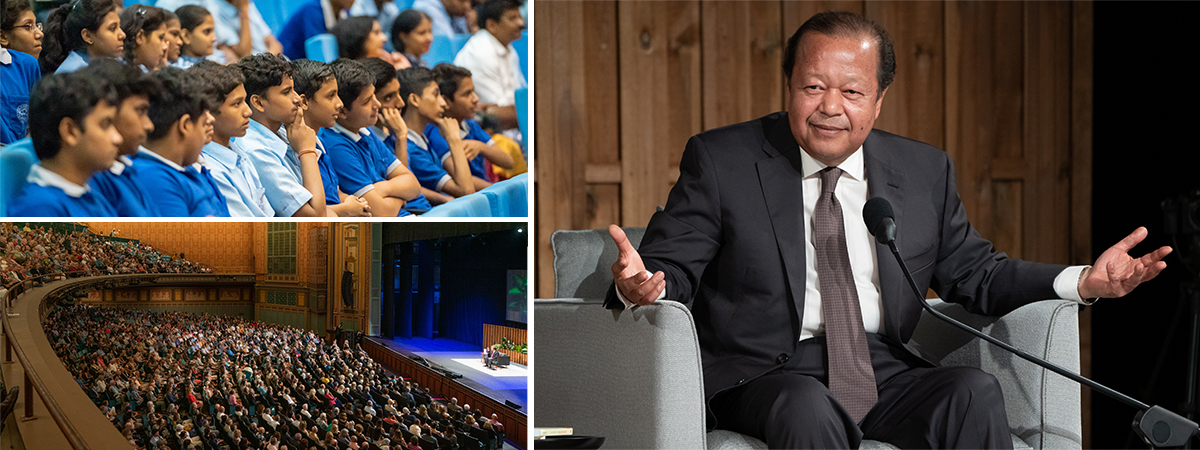Topics
 00:05:02
Hope VS Wishful Thinking
Video
Duration : 00:05:02
“Hope is more. Hope is ‘opportunity accepted.’ When you see that opportunity: ‘Y...
00:05:02
Hope VS Wishful Thinking
Video
Duration : 00:05:02
“Hope is more. Hope is ‘opportunity accepted.’ When you see that opportunity: ‘Y...
Prem Rawat
We need to know, we need to understand that we are the source for peace and peace isn't all this wishful thinking.
The same thing happens with hope. We don't know the difference between real hope and wishful thinking. And hope starts to convert into wishful thinking.
So when you are in trouble hope is, "I wish I wasn't in trouble." That's not hope. That's your wishful thinking.
Host: Interesting. I didn't know the difference before. Now I do.
Yeah. But it's beautiful,
Host: Yes.
because then when you look at hope then you ask the question, "What is hope?"
If it isn't wishful thinking...You're driving along, and all of a sudden you get two flat tires and you're hoping somebody will come. You're in the middle of the desert and you get two flat tires, you only have one spare, you need to get out of there, and you go "I hope somebody comes."
Host: That's wishful thinking.
Fifteen minutes ago you weren't thinking like that. But now all of a sudden... Is this wishful thinking or is this hope? Is this hope of fulfillment? Or is it hope to get out of trouble?
You're speeding, all of a sudden the police officer pulls you over and now you 'hope' he won't give you a ticket. You 'hope' he will just let you go. Hope! That's hope? Or that's wishful thinking?
You haven't done your homework, you arrive in your class And the teacher says, "Okay, who has..." and you're hoping that he won't ask for the homework because you haven't done it. That's hope? Or is it more than that? Is hope something to do with fulfilling this life?
Host: Yes. Agree.
Is hope to see the gift you have been given? Is hope to see the preciousness of each breath? Is hope to see how fortunate you are that you are alive? Or is hope, "I wish I was like him." That's not hope. That's wishful thinking.
So "show me, show me, how fortunate I am." "Show me the value of each breath."
"Let me not get lost in my problems." Because the problems will come, they will go, and they'll come back. And do you know that all the problems in the world they were bothering somebody else before you. So the problems don't change, the victims do. And then they'll come and bother you.
Hope is more. Hope is: Opportunity accepted. When you see that opportunity—Yes, I am alive. In the midst of all of that, "I am alive! I exist!" Take it. Take it.
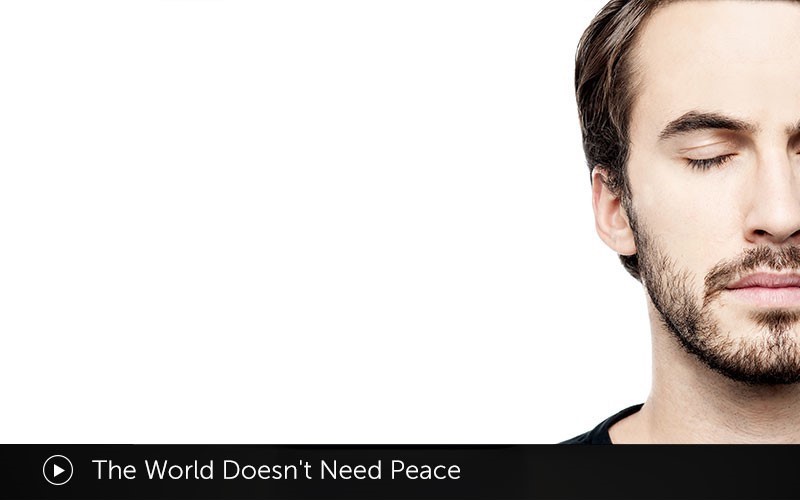 00:05:28
The World Doesn't Need Peace
Video
Duration : 00:05:28
"This life that you have is the most precious thing there is. Nothing will be mo...
00:05:28
The World Doesn't Need Peace
Video
Duration : 00:05:28
"This life that you have is the most precious thing there is. Nothing will be mo...
We're lost. Why? Everything we look for on the outside—the goodness, outside. You will never find it. And that's what people are looking for. Peace on the outside—world, they don't want personal peace. They want world peace. And I tell them, “World doesn't need peace.”
The crows are perfectly happy; the squirrels are perfectly happy; mangoes are perfectly happy. And if there is somebody that is bothering the crows and the squirrel and the mango? It's you, us, nobody else, nothing else. You need peace.
But do you understand that necessity? Do you understand this need that you have to be in that part of yourself that is good, that is beautiful by nature, by design, by the very fact that yes, light is the opposite of darkness? Understand this relationship between darkness and light, and you will understand a lot in your life. Believe me, believe me. I started talking about peace when I was four years old. At nine years of age, my father passed away and I took over the responsibility of taking this message around the world. Since then, I have been doing this. I have talked to people; when I was young, people used to come to me and they would ask me these questions, and I would give them an answer, what I felt, what I understood. What I tell you today is so that you can benefit in your life, that this life that you have is the most precious thing there is. Nothing will be more precious than this life that you have. The tragedy, the tragedy is to have this life and not know it, to have the wealth and not recognize it, to have the Divine and never find it. That's a tragedy. That's a tragedy. Looking for what you always had and you never found it because you didn't need to look–you needed to discover.
You have these eyes; these eyes see everybody else's eyes, don't they? But do they see themselves? These eyes can see everybody else's face but not yours. How come? Ah, but if you have a mirror, if you have a mirror, then these eyes can see you too. Then these eyes can see themselves as well.
And this begins with understanding that when you are in that darkness, when you are in that pain, when you are in that suffering, understand something: that joy, happiness, that beauty, that light is not far from you.
- Prem Rawat
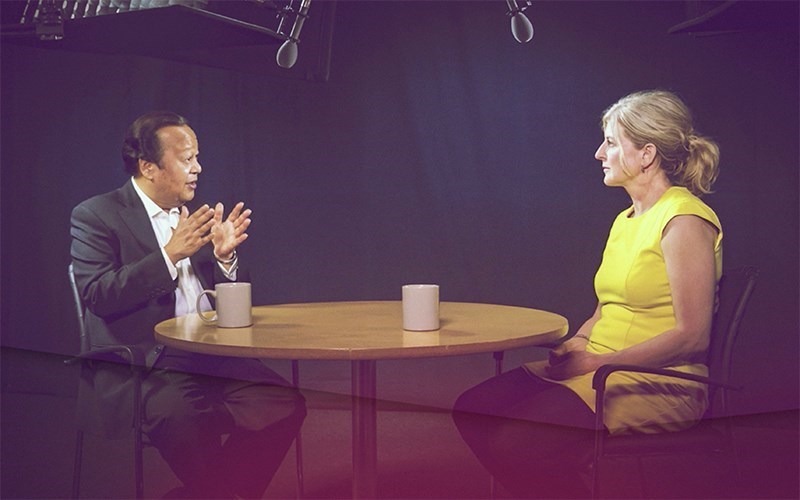 00:09:21
A Voice for Peace
Video
Duration : 00:09:21
We need to help each other, not get in each others’ way.
00:09:21
A Voice for Peace
Video
Duration : 00:09:21
We need to help each other, not get in each others’ way.
Helle Solvang:
So, Mr. Prem Rawat, I’m doing this language laboratory program in the Danish radio. It’s a weekly magazine where my main focus is to try and discover how language can change people and how we can change ourselves and our surroundings through language.
Prem Rawat:
Well, first of all, thank you very much for having me on this show. And what I have learned is, language, or whatever we use to communicate—we need to communicate; we have a need to communicate. And sometimes people don’t see the need—that they need to communicate.
I mean, in this world today, there are obviously those people who believe in peace and who want peace to be there. When you look at all these wars going on, it is the innocent victims who had nothing to do with making those decisions, who are getting punished. And if they could say something, what would that be?
And that, to me, would establish the need—but they don’t have a voice. And to me it’s like, no, there has to be the voice of need that needs to be the loudest for humanity, the need to be in peace, the need to prosper, the need to be content, the need to be fulfilled.
And just, the need to live a life that they feel is good, that they can be; they can practice their religion; they can practice their faith; they can practice their understanding and have a path that they can go on, that can allow them to better themselves. This is the need, and we need to help each other, not get in each others’ way.
So, taking away that greed and taking away differences and starting to see the similarity, that’s the vision of clarity; that is the voice of clarity, and that is the voice of peace.
Helle Solvang:
Concerning the “voice of peace,” and the “language of peace” that we’ve been weaving around here, you’ve been traveling through so many countries and visiting so many cultures—you’ve got them under your skin. Are there any languages or any cultures in the world that you would say have peace as their core foundation?
Prem Rawat:
I think all of them do. The idea of peace, the feeling of peace, the need for peace, the want for peace has been there with us all along. The better half of a human being is peace. And I think that all cultures do give rise to that—you know, do give credence to that.
“Shalom! Salaam!” Peace! To greet a person by saying, “Peace. May peace be with you.” And this is coming from some of the regions that have been fighting with each other for such a long time! And yet, the first word uttered to greet another human being is “peace.”
I think we want peace, you know? But that voice is so dim now, overshadowed by the noise of greed and arrogance and anger and fear... I mean, so many politicians, they use fear! Fear—“But you don’t do this, then this will happen. And, don’t you, you know, and”—fear!
Give people information; let people make up their mind. Give people information! Don’t manipulate their emotions. Give them information, because I think people are intelligent and will make the intelligent choice.
Helle Solvang:
When I listen to you, I also think sometimes that there’s a heavy load on each individual—the force or the need to change and transform into a better environmentalist, into a more peaceful person, and to be talking in a more peaceful language.
So, how much of the peace and prosperity and of our survival in this world is based on the individual changing and transforming—and how much on systems changing and performing?
Prem Rawat:
That’s a really, really good question. Because, when you were asking that, I was just thinking in my own head, “Is ‘being green’ normal, natural, real? Or is it something that we have to change for?”
So, being green, does that mean...? Is that a deviation? Or, is it coming back to the track where you should have been all along? Being kind, is that a deviation, or is that where you should have been all along?
So, when you start to look at, “That yes, this takes effort”—but it’s only because we have already deviated. And this exercise is not about deviating further, but it’s coming back to where you should be, being human. That’s being human.
And I think that having generosity, having clarity, having kindness, having good choices is normal. And where we are, where it’s anger, it’s fear, it’s, “Destroy nature, capture nature, arrest nature, tame nature,” I think that’s deviated. Because you can work with nature—and she will work with you. Or you can be saying, “I want to tame you”—and she will tame you.
That change that really needs to happen is about understanding who we are—not looking at our differences, but our similarities. And, that in fact, if we all came together—not everyone has to come together—enough of us have to come together—it is, you know, the mass.
Enough of the mass comes together where the greedy become a true minority. And those people who truly understand generosity, acceptance of a human being, acceptance of what we have on this earth—that’s generosity. And I think something amazing is going to happen, amazing is going to happen.
But those who need that voice don’t have it! Because they are like, “No, don’t say anything.” And I think everybody needs to come together and say, “No, say it. Say it.” Say you are alive; say you are here; say you want heaven here—and I think amazing things will happen.
Helle Solvang:
Thank you.
Prem Rawat:
It’s been a pleasure.
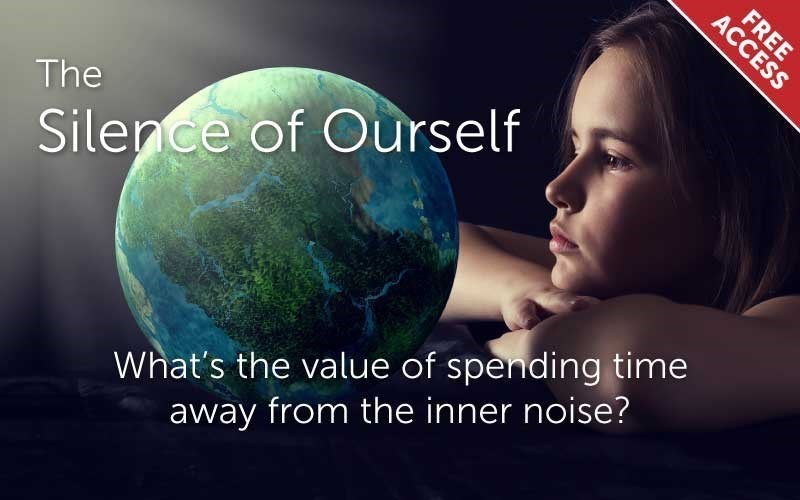 00:04:36
The Silence of Ourself
Video
Duration : 00:04:36
What’s the value of spending time away from the inner noise? Find out now.
00:04:36
The Silence of Ourself
Video
Duration : 00:04:36
What’s the value of spending time away from the inner noise? Find out now.
Prem Rawat: On this planet Earth, there are ten quintillion insects. I don’t know if you can imagine that but ten quintillion insects. There are 7.9, (it’s .89 but) 7.9 billion people on the face of this earth. And there’s so much that is going on that we get lost. We get agitated. We get tripped up every day.
Coming here, it was supposed to be twenty minutes. It was over forty-five minutes. Traffic! And you’re sitting in a car going, “I’m going to be late. I’m going to be late. I’m going to be late. I’m going to be late. Oh my God, what’s going to happen? What...?” It’s noise. It’s noise! We get so lost in this noise.
When do we acknowledge the silence of ourselves? Away from that noise is something amazing. Away from all that, there is a human being aspiring to live in peace. And everything else is getting in the way. “No, you’d better do this; no, you’d better look at this, and no, you do this, you, no, you do this.”
All right! I understand. But do you know what the ultimate conclusion is going to be? The ultimate conclusion, whether you consider yourself to be successful in this world or not...? It doesn’t matter if all you made was one quarter, just a quarter—or you made ten billion. The fate reserved for you is identical.
No privilege: “All those who made more than a quarter, use that door. All those who made less than the quarter, use that door,” no! You just, you will share the identical fate.
So now, the variance is not that. The variance is, the difference is what you accomplish, not in regards to anybody else, but to you! That you experience peace, that you experience joy, that you experience understanding. That you experience clarity in your life. Not confusion.
 00:02:48
Life Is About Enjoyment
Video
Duration : 00:02:48
“The infinite was there when you were one, and two, and three, and four, and fiv...
00:02:48
Life Is About Enjoyment
Video
Duration : 00:02:48
“The infinite was there when you were one, and two, and three, and four, and fiv...
Prem Rawat:
Is peace still possible? Yes, peace is still possible. Is joy still there, yes; your heart is still there, yes. Is the infinite still around? Of course. And so far the infinite is around, you’re set! If the infinite is gone, then you’re in trouble. But the infinite is around, and you are around? It’s all good.
When I was in lockdown, (hah, hah-hah), a long time ago, I, you know, in the 80s, I had turntables. I had records. So, I said, “You know, I had these wonderful, beautiful records. Where are they?” And couldn’t find them, couldn’t find them, couldn’t find them, couldn’t find them, and then one day, way back tucked somewhere, there they were, all my records.
And I brought them out, started cleaning them. And there they were! They were something that I had gone, I had bought. Some of them had been unopened; they were unopened albums. And there they were from the 70s, all this incredible music and – there it is! I realized, “I’m not going to take it with me. But I’m going to enjoy it, so far I can enjoy it.”
This life, my friends, is about enjoyment. And if you can enjoy the divine, that’s the motherlode. Because there’s nothing like the divine. Always there. Always was. When you were one, when you were two, when you were three, when you were four, five, six, seven.
Isn’t it nice to discover something that is from a long time ago in your life that you liked, and it was wonderful? (Like my records?) Well, the infinite is like that. The infinite was there when you were one, and two, and three, and four, and five – all the way to however old you are.
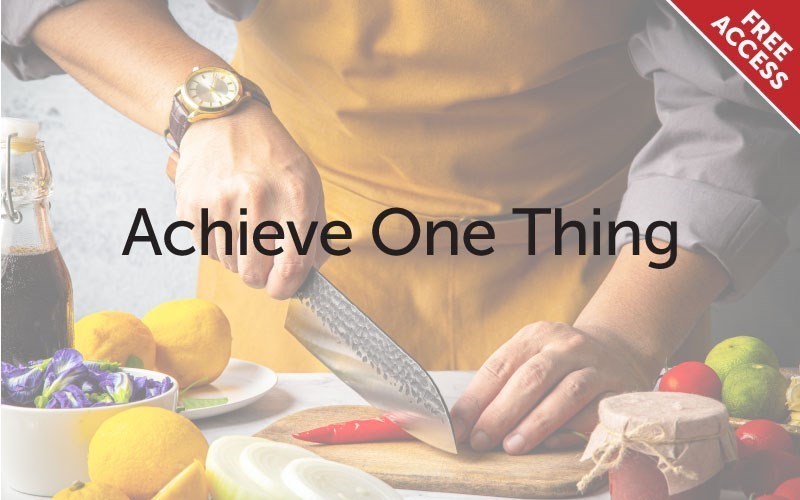 00:04:24
Achieve One Thing
Video
Duration : 00:04:24
“You need to find peace – not the Google-search peace, not the DuckDuckGo peace ...
00:04:24
Achieve One Thing
Video
Duration : 00:04:24
“You need to find peace – not the Google-search peace, not the DuckDuckGo peace ...
You have to be careful; you have to be conscious.
If you become unconscious when you’re trying to cook? You will end up putting sugar where you should put salt; you will put salt where you should put sugar. And that’s a disaster.
So! What about life? When you drink water, do you have to be careful? What do you think? Otherwise, you’ll choke on it. And that’s not a pleasant experience, is it?
When you eat, do you have to be careful? Or you slurp? No! You have to be careful. When you live your life, do you have to be careful, or do you ... ? Are you careful? No, you’re not! Nope, absolutely not. Otherwise, this whole “hurt my feelings” thing would never happen!
That’s like, you’re looking over there and you’re cutting, and “Oops!” And here’s the problem. You’re going to need a sharp knife! To cut vegetables, you need a sharp knife! And of course, if you misuse it, it’ll cut you even more. You’ve got to be aware, got to be conscious.
So, this whole thing of, “Yeah, that person hurt my feelings. That person said that to me, and that person didn’t do that, and that person ... .” Please, live your life consciously. Don’t let these trivial things happen. It wastes too much money, too much effort, too much energy, too much everything that may be dear to you. It’s not worth it.
Live this life so you enjoy every day. You need peace. As a human being, you need peace. You have to have peace. Whatever you are trying to acquire… Whatever knowledge you’re trying
to acquire in this world – you need to find peace. Not the Google-search peace. Not the DuckDuckGo peace. But the peace that is in your being.
If you’re not going to make it happen, who is?




